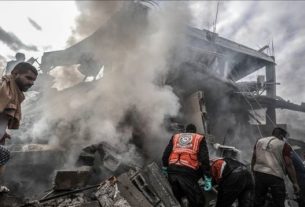Pakistan’s democracy has been mangled by repeated overtures to authoritarian tactics, often to justify violence and oppression. That has resulted in a hostile and polarized political landscape, where finding any common ground is an insurmountable challenge.
By Saad Hafiz
The political situation in Pakistan is changing quickly. There is a high-stakes power struggle between former Prime Minister Imran Khan and the current government, which has the support of the military. It is putting the country’s fragile democracy at risk and has raised concerns about violence and civil unrest.
Khan, who was ousted in a 2022 no-confidence vote, has emerged as a formidable opposition leader who has rallied his supporters from jail and claims victory in the disputed 2024 elections. Plans to ban the PTI party could make Pakistan more of a dictatorship. Telling people they can’t support the PTI won’t make them like Imran Khan any less. It might make them like him more. And it could make Pakistan’s already shaky politics even worse.
The recent Supreme Court judgment in favor of PTI challenges the common perception of the judiciary as a compliant institution. Contrary to expectations, the court has shown it can make independent decisions that go against the military’s interests. This key ruling has far-reaching implications for the relationship between the government branches and the military’s role in the country’s affairs. The court has proven that it can take an independent path rather than just approving the established power structures.
The government has made a deal for another IMF bailout program. It may help to make the country’s overall economy more stable, but it will also mean that the most vulnerable citizens will have to pay more taxes and higher power bills.
Prime Minister Shehbaz Sharif’s government is determined to maintain its grip on power and resist Khan’s demands. This clash of political wills could escalate into a full-blown crisis, with both sides unyielding in their positions. The stakes are high, as the outcome will shape the future of Pakistan’s hybrid democracy and its relationship with the international community.
Furthermore, the country is experiencing an acute economic crisis, with high inflation, increasing unemployment, and a weakening currency. The political instability is likely to make the financial risks even worse. Many people criticize the government for not managing the economy effectively and for protecting the interests of the rich. The government has made a deal for another IMF bailout program. It may help to make the country’s overall economy more stable, but it will also mean that the most vulnerable citizens will have to pay more taxes and higher power bills.
Some bureaucratic officials advise on domestic economic policies and oversee an economy burdened by a large defense budget and heavy dependence on foreign loans. The military suppresses domestic unrest and runs security and foreign policies.
The country has a troubled political history with conflicts and undemocratic tendencies, giving it a reputation as a “political basket case.” It has made it hard to implement effective policies, which are crucial for progress. Failing to turn policies into actual results has held back development and allowed challenges like poverty and unemployment to continue.
The 2018 general elections in Pakistan, which brought Khan and his Pakistan Tehreek-e-Insaf (PTI) party to power, were controversial. Opposition parties complained of widespread fraud and refused to accept the government’s legitimacy.
The country’s imperfect combination of democratic and military systems is facing an enormous challenge because of ongoing political problems. The system has a lopsided balance between weak civilian and powerful military institutions. It involves politicians approved by the establishment with limited authority, elite manipulation, and corruption.
Governments rely on political engineering or the establishment’s support to stay in power. This controversial practice involves various strategies and tactics to influence the political situation and keep certain groups in power. The military believes this is necessary to keep the country stable because it has many divisions and faces threats.
The political environment has become more extreme, with less willingness to find common ground
and work together, leading to increased fighting between different groups and
making extremism more common.
Some bureaucratic officials advise on domestic economic policies and oversee an economy burdened by a large defense budget and heavy dependence on foreign loans. The military suppresses domestic unrest and runs security and foreign policies.
Historically, the leaders of Pakistan, both in the military and civilian sectors, have often used authoritarian tactics to justify oppression and violence, undermining democracy. They have not done enough to support democratic principles such as listening to and respecting the will of the people, following the rules of the constitution, and protecting individual freedoms. The political environment has become more extreme, with less willingness to find common ground and work together, leading to increased fighting between different groups and making extremism more common.
It is a fact that building a democracy takes time and happens over many years. In genuine democratic countries, politicians sometimes stop fighting to focus on governing and building infrastructure to gain support. When different political parties take power, they give resources to their supporters first, but they don’t undo what the previous leaders did. It’s better to have a lively but imperfect opposition than to have things stay the same because it keeps people involved and makes sure those in power do what the people want.
In today’s divided political climate in Pakistan, expecting agreement among politicians and maintaining military neutrality is hard. Stability depends on leaders setting aside their differences and finding common ground. The military must remain nonpartisan and fulfill its duty to protect all citizens, regardless of their political affiliations. Failure to do so on either front could have severe consequences for the country.__Courtesy The Friday Times





